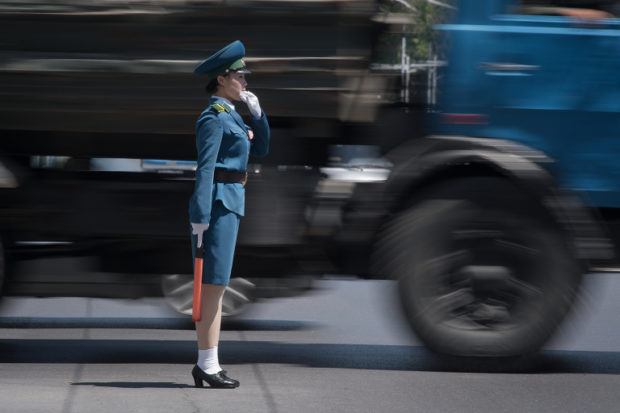Driven to distraction: Pyongyang’s ‘traffic ladies’

A traffic security officer stands on duty at an intersection in Pyongyang. Image: AFP/Ed Jones
Snapping their heads from side to side, marching into the roads in close-fitting blue uniforms and black heels, the “traffic ladies” who marshal vehicles at the intersections of Pyongyang are an emblematic image of the North Korean capital.
Officially known as traffic security officers but universally referred to as traffic ladies, they are chosen for their looks in a society that remains traditionalist in many respects.
They must leave the role if they marry, and have a finite shelf-life, with compulsory retirement looming at just 26.
The 300-odd ladies are unique to Pyongyang, which North Korean authorities are always keen to present in the best possible light despite their nuclear-armed country’s impoverished status, and ensure a steady supply of photogenic young women who are the favorite subject of visiting tourists and journalists.
“They are representing the capital city,” explained a senior officer of the ministry of public security, which supervises traffic regulation. “That’s why they are selected based on their appearance and physique.”
No age limit applies to their roughly 400 male counterparts, who tend to be stationed at roundabouts.
The rules were because “normally, the women in our country marry at the age of 26 or 27,” explained the officer, who did not want to be named. “Because the role is tough and difficult, they can only do the job when they are single.”
Tough training
The traffic ladies were originally introduced in the 1980s, when vehicles were a rarity on the streets of Pyongyang and remained so for decades, giving rise to the surreal sight of them directing, with precision and energy, non-existent cars on wide but deserted boulevards.
As part of North Korea’s security forces they hold officer ranks, and senior captain Ri Myong-Sim, 24, said: “I have to carry out each and every action with discipline and spirit.”
A seven-year veteran, she cuts an imposing presence in her high-peaked cap and white gloves.
Her “tough training” had involved “exhausting repetition” of the moves, she told AFP.
“But every time I felt that, the thing that kept me going and drove me was the thought that our leader, who cares for only the happiness of our people all year long, was watching us work,” she said, standing ramrod-straight at the Changjon crossroads in central Pyongyang. “So I could practice throughout the night and keep going on the next day without feeling tired at all.”
Ordinary North Koreans normally only express officially approved sentiments when questioned by foreign media. An obelisk down the road proclaimed: “The Great President Kim Il-Sung and the Great Leader Kim Jong-Il will always be with us.”
Great love
Vehicle numbers have increased in the capital in recent years as authorities quietly liberalize the economy, leading to growth despite United Nations sanctions imposed over Pyongyang’s nuclear and missile programs, although the North keeps most statistics secret and precise figures are not available.
Traffic lights have been introduced at most intersections, but the ladies—who say they work an hour on, an hour off, although their feet can still get sore—have no fear of their blue uniforms being replaced by red, amber and green. The lights “help the humans do their jobs more easily,” said Ri.
Their kit includes thick cotton coats for winter, when their breath condenses instantly in the bitter cold, flashing orange halters for night work, and sunscreen.
“The great leader shows them endless care and love,” the ministry officer said. “That’s why they do their best in their efforts, to repay the great love of the great presidents and dear Respected Marshal Kim Jong-Un.”
Second to none
The traffic ladies are “second to none” as a photo subject for tourists visiting Pyongyang, said Simon Cockerell, general manager of specialist travel agency Koryo Tours, who has been leading trips to North Korea for more than 15 years.
“They appear to have the dual function of directing traffic and brightening up the streets of the capital,” he said. “I don’t believe there has been a tourist who has visited Pyongyang and not taken a photo of a traffic lady.”
“I think it would be no exaggeration to call them iconic,” he added, although they were “somewhat objectified” by visitors.
With retirement ahead, senior captain Ri is taking a training course to become a teacher. But she let the facade of discipline slip when asked if the focus was annoying.
“We are so concentrated on doing our jobs we rarely notice the attention,” she giggled. JB
RELATED STORY:
UN veteran is South Korea’s first female foreign minister














